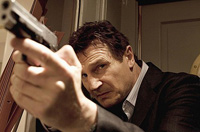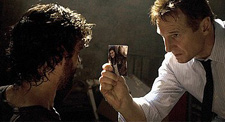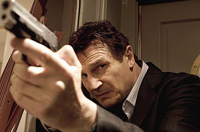When 17-year-old Kim Mills asks her father for permission to spend three weeks in Paris with a girlfriend to visit museums, he’s reluctant to consent. A retired CIA covert paramilitary operative, Bryan Mills (Liam Neeson) sees the world as a dangerous place—too dangerous for a pair of 17-year-olds more or less on their own in a city like Paris.
“Mom says your job made you paranoid,” Kim (Maggie Grace) says almost shyly.
“My job made me aware,” Bryan answers.

Awareness is a relative quality; there is such a thing as being too aware. Paranoia may be an occupational hazard for black-ops agents, but the same may be true for film critics, or even moviegoers with a diet of too many action movies. Many of us, over-exercised by media sensationalism and TV and movie violence, habitually overestimate the extent to which we are at risk on a day-to-day basis. One may start to feel that imminent danger lurks around every corner, that every passer-by is a potential assailant.
Novelist David Foster Wallace described how pornography sexualizes real life by creating a narrative world in which sex is always a heartbeat away. In a similar way, thrillers like The Brave One and Man on Fire, in which violent crime is always a heartbeat away, may be a kind of violence porn. Where other movies—Die Hard, say—deliberately depict highly exceptional and extraordinary circumstances, these movies depict terrifying crimes as the norm—as what is likely to happen at any time to anyone.
Directed by Luc Besson protégé Pierre Morel (District B13) and produced and co-written by Besson, Taken is slicker and smarter than that. Although well-crafted but improbable action set pieces cast the 56-year-old Neeson as an essentially indomitable force taking on and prevailing against almost any number of gun-toting assailants—like Jason Bourne, Bryan combines boundless resourcefulness with essentially indomitable physical prowess—the film’s emotional force rests on the comparatively persuasive setup.

Although Bryan’s worst fears are realized almost immediately as Kim and Amanda are abducted by Paris’s Albanian mafia within hours of their arrival, they aren’t just snatched off the street or randomly assaulted after making a wrong turn into a bad neighborhood. A gangland spotter targets them at the airport, makes friendly conversation, offers to share a cab, and finds out where they are staying. The lesson, then, is not so much that cities like Paris are treacherous sinkholes of depravity, like the Mexico City of Man on Fire, as it is “Be careful who you talk to and who you trust.”
While a hero galvanized into action by a threat to a family member such as a daughter or a wife is the oldest device in the book, Bryan’s family life isn’t the idyllic domestic happiness other heroes enjoy. He’s divorced and alone, his ex-wife Lenore (Famke Jenssen) is remarried to a wealthy businessman named Stuart (Xander Berkeley), and he barely knows Kim.
As the film opens, Bryan, in the hope of building bridges to Kim, has retired from the job that cost him his marriage and took him away from his daughter. In addition to an action-revenge movie, then, Taken is a redemption story of sorts. Bryan may not have been there for Lenore or for Kim when she was growing up, and he might not be able to compete with Stuart when it comes to lavish birthday presents—but when Kim is abducted, it’s Daddy’s turn to make good, in spades.

Unfortunately, Bryan’s paternal redemption is marred by excursions into gratuitous torture and even overt terrorism. In one scene, even after a thug spills all he knows after a couple of excruciating bouts with electroshock torture, Bryan leaves him strapped down with the power on. Later, confronting a corrupt government official over dinner with his wife, Bryan shoots the unsuspecting wife in the leg—and threatens to kill them both—unless the official gives him what he wants. “Please apologize to your wife for me,” Bryan curtly says later, but there are some things you can’t apologize for, especially when you aren’t sorry.
It would be one thing if the film offered any critique of its hero’s darker side—if there were some sign, as in last year’s The Dark Knight, of the risk the hero runs of becoming the bad guy. But no: As with Denzel Washington’s murderous crusade in Man on Fire, Bryan’s entire campaign is sanctified by his paternal love for an innocent girl in danger.

Late in the film Bryan makes a rare mistake that leaves him briefly at the mercy of his enemies, and makes a candid plea for his daughter’s life. A mob boss—a father himself, with two sons and a daughter—expresses token sympathy before ordering Bryan killed. Taken fleetingly invites us to see a human side to Bryan’s enemies, one sense in which they are not entirely unlike Bryan. Yet I see no hint of corresponding awareness of the sense in which Bryan is not entirely unlike them, willing to hurt even innocent people to get what he wants.
The scenario of a righteous butt-kicking American hopping the pond to Paris to take on corrupt French officials as well as slimy Balkan gangsters has understandably struck some critics as Europhobic, notwithstanding the Gallic talent behind the camera. That the movie apparently expects audiences to applaud or at least overlook his brutal tactics is jarring to say the least.
Equally problematic is the depiction of the trafficking of sex slaves in what is ultimately a conventional revenge thriller, which ultimately crosses into exploitation. The 2007 film Trade wavered between being a hard-hitting socially aware drama about human trafficking and a thrilling action-adventure movie. Taken embraces the latter route. That probably makes it a better movie, but also a more objectionable one.
Talk About It
Discussion starters- Why do you think Kim isn’t completely honest with her father about her travel plans? Is Bryan partly responsible? Why or why not?
- Were you ever given permission to do something as a youth that you later thought you shouldn’t have been allowed to do? Or, if you are a parent, have you ever given a child permission to do something and later regretted it? Why do you think the decision was a mistake?
- Do you think parents you know tend to be too permissive with their children? Too overprotective? Both? Neither? Why do you think this happens? What advice would you like to give such parents?
- Do you feel that you personally tend to overestimate or underestimate the risks you face on a day-to-day basis?
- What are your thoughts about torture (or “enhanced interrogation”)? Does it depend on the circumstances? Discuss.
The Family Corner
For parents to considerTaken is rated PG-13 for intense sequences of violence, disturbing thematic material, sexual content, some drug references and language. Bryan’s rampage leaves a sizable body count in his wake—at least forty or fifty shot, stabbed or incapacitated. One scene is set in a sex trafficking brothel; another depicts an auction in which wealthy bidders vie from the shadows for girls forced to stand in their underwear. There’s quite a bit of foul language and some taking God’s name in vain.
Photos © Copyright 20th Century Fox
Copyright © 2009 Christianity Today. Click for reprint information.












